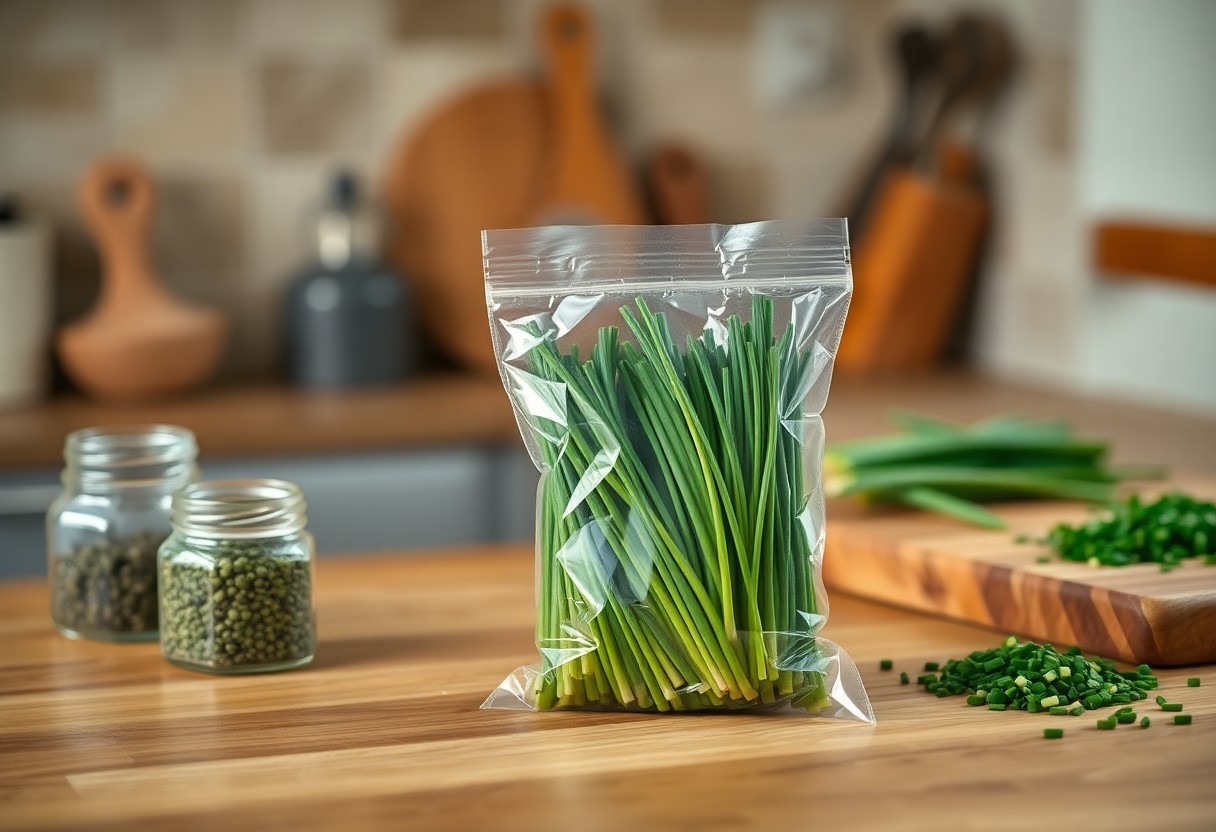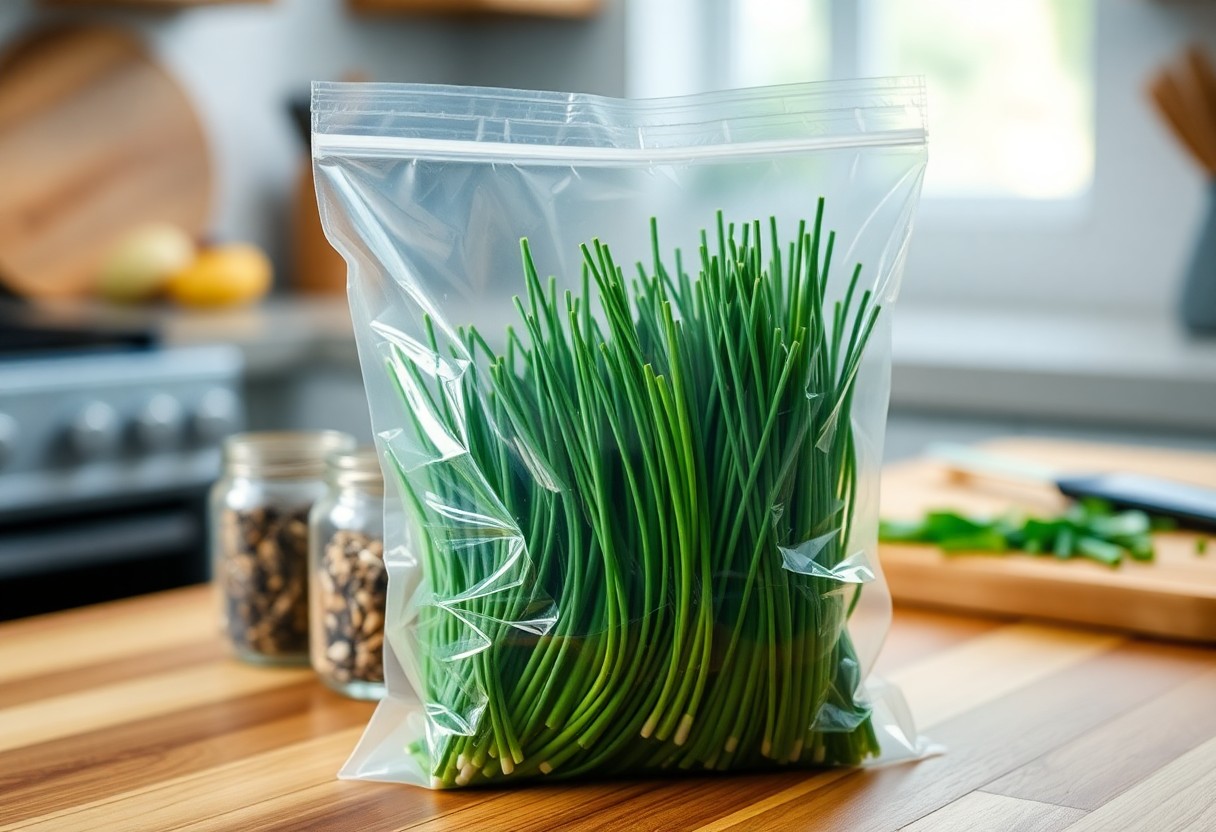Many people enjoy using chives to enhance their culinary creations, but you may wonder how long your packaged chives will last and the best ways to store them.
Understanding the shelf life of chives and employing proper storage techniques can help you maintain their vibrant flavor and freshness.
In this guide, you’ll discover crucial tips for deciding when to use your chives, how to extend their lifespan, and what signs to look for to ensure your herbs are safe to consume.
Key Takeaways:
- Packaged chives typically last for about 1 to 2 weeks when stored in the refrigerator, depending on their freshness at the time of purchase.
- To extend their shelf life, keep chives in an airtight container or wrap them in a damp paper towel and place them inside a plastic bag.
- For longer storage, consider freezing chives; they can be chopped and stored in an airtight container or freezer bag for several months without losing flavor.
Understanding Packaged Chives
Your experience with fresh herbs can be transformed by packaged chives, which offer a convenient way to add flavor to your dishes. These herbs come pre-washed and ready to use, making them an excellent choice for busy cooks who want to enhance their meals without the fuss of preparation. Knowing how to store them properly will ensure you get the most out of your packaged chives.
What Are Packaged Chives?
Any kitchen enthusiast will recognize packaged chives as a popular herb commonly found in grocery stores. Available in sealed containers or bags, they provide a mild onion flavor that complements a variety of dishes, from salads to soups. Packaged chives are typically harvested, cleaned, and vacuum-sealed to maintain their freshness and flavor, making them accessible year-round.

Nutritional Benefits of Chives
Understanding the nutritional profile of chives can elevate your cooking and health. These vibrant herbs are low-calorie and packed with vitamins A, C, and K, which are vital for maintaining your immune system, promoting healthy skin, and supporting bone health. Additionally, chives contain antioxidants that help reduce inflammation and fight free radicals in your body.
Another great feature of chives is their potential health benefits. They are known to possess anti-inflammatory properties, which can support your overall wellness. With their rich source of nutrients and ability to boost your flavor profile, incorporating chives into your meals enhances both taste and health. Whether sprinkled over a dish or mixed into sauces, chives are a delicious way to nourish your body.
Shelf Life of Packaged Chives
You may be wondering how long packaged chives can last in your pantry or fridge. Typically, packaged chives can remain fresh for around 1 to 2 weeks past their sell-by date when stored correctly. However, if you notice any signs of spoilage, such as discoloration or a foul smell, it’s best to discard them to ensure your dishes remain safe and flavorful.
Factors Affecting Shelf Life
You should be aware of several factors that can affect the longevity of your packaged chives:
- Storage conditions such as temperature and humidity
- Packaging integrity and whether it is opened or unopened
- Quality of the chives at the time of purchase
After understanding these factors, you can maximize the shelf life of your chives and enjoy their fresh flavor for longer.
Typical Expiration Dates
After purchasing packaged chives, you might notice expiration dates printed on the label.
But be aware that the date indicates optimal freshness, not a hard stop on usability. In most cases, unopened packaged chives can last up to 2 to 3 weeks beyond the printed date when kept refrigerated. However, if the package is opened, their shelf life shortens considerably. Signs of spoilage include slimy texture or an off-putting smell, both of which are serious indicators that they should be discarded to avoid any food safety issues.
Storage Tips for Packaged Chives
Now that you have your packaged chives, it’s important to store them properly to maintain freshness. Here are some tips to keep in mind:
- Store in the refrigerator in a breathable container.
- Keep them dry to prevent mold growth.
- Avoid cutting until you are ready to use to maintain their flavor.
Knowing these simple storage techniques will help you maximize the lifespan of your chives.
Best Practices for Refrigeration
About you want to ensure your chives remain vibrant and aromatic in the refrigerator. Store them in a paper towel to absorb moisture and place them inside a plastic bag, sealing it loosely to allow airflow. This keeps your chives fresh for longer while preventing wilting or spoilage.
Freezing Chives for Long-Term Use
By freezing your chives, you can enjoy their flavor for an extended period. After washing and drying your chives thoroughly, chop them up if desired, then place them in an airtight container or freezer bag. Ensure to remove as much air as possible before sealing.
Packaged chives can be frozen effectively without losing their flavor. When you’re ready to use them, add them directly to your dishes from the freezer, as they will thaw quickly. This method not only preserves their taste but also prevents any risk of spoilage from prolonged refrigeration. Just be mindful that their texture may change slightly, but the flavor remains intact.

Signs of Spoilage
For packaged chives, recognizing signs of spoilage is necessary to ensure your safety and the quality of your meals. Always be vigilant about what your chives look like, how they smell, and taste before using them. Spoiled chives can ruin your dish and may even cause foodborne illnesses if consumed.
Visual and Textural Indicators
An important way to assess the freshness of your chives is by examining their color and texture. Fresh chives should appear vibrant green and firm. If you notice any signs of wilting, browning, or sliminess, it is time to discard them. These visual changes indicate that your chives have begun to spoil.
Smell and Taste Tests
To ensure your chives are still good, trust your nose and palate. Fresh chives have a mild, onion-like aroma, while spoiled chives may emit a sour or rancid scent, indicating they have gone bad.
Further testing can be done by sampling a small piece of your chives. If the flavor is off-putting or bitter, it’s best to throw them away. Consuming spoiled chives can pose health risks, including foodborne illness. Always prioritize your well-being by checking both smell and taste before including them in your dishes.
Using Chives Past Their Expiration
Keep in mind that chives can still be used past their expiration date if they show no signs of spoilage. If the chives appear fresh, with vibrant green color and a pleasant aroma, they are likely safe to use. Always trust your senses; if they smell off or look wilted and brown, it’s best to discard them.
Safety Considerations
Beside visual cues, assessing the texture and smell of your chives is important. If they feel slimy or emit an unpleasant odor, these signs indicate spoilage. Consumption of spoiled chives can lead to foodborne illness, so always prioritize safety when determining their usability.
Culinary Uses for Older Chives
Safety is key when using older chives, but if they are still in acceptable condition, you can get creative. Chop them finely and incorporate them into cooked dishes where their texture is less noticeable, such as in soups, stir-fries, or egg dishes. They can also be blended into sauces where their flavor will enhance the overall taste without being compromised by their age.
Past their prime, older chives can still shine in certain culinary applications, especially when properly prepared. You might consider stirring them into potato salad or quiches, where the cooking process enhances their flavor and diminishes any less-than-perfect texture. Additionally, infusing oils with chives can provide a delightful aromatic touch to dressings. Just ensure they remain safe to eat, examining any signs of spoilage to avoid health risks.
Summing up
From above, you can see that packaged chives can last for up to 2 weeks in the refrigerator if stored properly. For optimal freshness, keep them in a tightly sealed bag or container. If you notice any signs of wilting or discoloration, it’s best to use or discard them promptly. Alternatively, you can freeze chives for longer-lasting storage, extending their shelf life significantly. By following these guidelines, you can enjoy flavorful chives in your dishes longer and reduce food waste.
FAQ
Q: How long do packaged chives last in the refrigerator?
A: Packaged chives typically last about 1 to 2 weeks when stored properly in the refrigerator. It’s ideal to keep them in a breathable container or wrapped in a damp paper towel to maintain their freshness. If you notice any wilting or discoloration, it’s best to use them promptly.
Q: Can I freeze packaged chives for longer storage?
A: Yes, you can freeze packaged chives to extend their shelf life. It’s advisable to wash and chop the chives before placing them in an airtight container or freezer bag. When stored in the freezer, chives can last for up to 6 months. However, be aware that freezing may impact their texture, making them more suitable for cooked dishes rather than fresh use.
Q: What signs indicate that packaged chives have gone bad?
A: Packaged chives may spoil if they turn yellow, develop a slime layer, or emit a foul odor. If you notice any of these signs or if the chives feel mushy or have an off appearance, it’s best to discard them. Fresh chives should appear vibrant green and firm to the touch.
Q: Is there a difference in shelf life between fresh and dried chives?
A: Yes, there is a significant difference. Fresh packaged chives typically last 1 to 2 weeks in the refrigerator, while dried chives can last for several months or even up to a year if stored in a cool, dark place. However, dried chives may lose some flavor over time, so it’s recommended to use them within 6 months for the best quality.
Q: What’s the best way to store packaged chives to maximize their shelf life?
A: To maximize the shelf life of packaged chives, store them in the refrigerator in a breathable container, such as a produce bag, or wrap them in a slightly damp paper towel before placing them in a plastic bag. Keeping them in the crisper drawer can also help maintain their freshness. Avoid storing chives in sealed plastic bags, as they may trap moisture and promote spoilage.